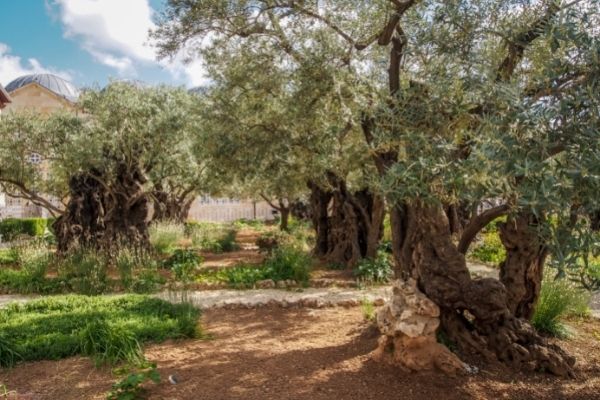Transforming lives with Good News in the Nation’s Capital
Day 8: The Garden
Apr 13, 2025
Countdown to the Resurrection
The Agony & Acceptance of Gethsemane
The Passover meal is over, and the disciples now make their way to a familiar site — the Garden of Gethsemane at the base of the Mount of Olives. It had been a long day filled with preparations for the Seder. As they entered the Garden, Jesus told the disciples to take care lest they fall into temptation. Given that the Seder meal ended with an accusation of betrayal, an argument over which disciple was the greatest, and a cryptic discussion about the need for swords, the disciples were physically and emotionally exhausted. Such a caution would seem timely.

Jesus then left most of His disciples but took Peter, James, and John with him. At that moment, He became extremely distressed and told the three of the “exceeding” depth of sorrow that was beginning to overwhelm Him. He then walked about 20 feet farther (“about a stone’s throw”) into the garden.
He went a little farther and fell on His face, and prayed, saying, “O My Father, if it is possible, let this cup pass from Me; nevertheless, not as I will, but as You will.” Then He came to the disciples and found them sleeping, and said to Peter, “What! Could you not watch with Me one hour? Watch and pray, lest you enter into temptation. The spirit indeed is willing, but the flesh is weak.” Again, a second time, He went away and prayed, saying, “O My Father, if this cup cannot pass away from Me unless I drink it, Your will be done.” And He came and found them asleep again, for their eyes were heavy. So He left them, went away again, and prayed the third time, saying the same words (Matt. 26:39-44).
In this powerful season of prayer, we see the humanity of Jesus on full display. He prays that “this cup” would be taken from Him. Yesterday, we mentioned the four cups of the Seder meal. Jesus and the disciples partook of three of the four cups — the Cup of Sanctification, the Cup of Plagues and the Cup of Redemption, which was taken after the meal.
But the Gospel writers make no mention of the fourth cup, the Cup of Hallel, which means praise. Some traditions call it the Cup of Acceptance and others the Cup of Elijah. All the cups point to one thing: The full judgment of God against sin would be placed upon Jesus as He endures an agonizing death on the cross.
In the Passover, Israel is spared through the blood of sacrifice as judgment falls upon the firstborn in all of Egypt. As David Brickner wrote in the article “The Mystery of the Passover Cup,” “In His humanity, Jesus could wish that this cup of judgment—the one that everyone except Him deserved for breaking of God's covenant—would pass over Him.”
Such was the intensity of His agony that capillaries literally burst in His forehead as He sweat great drops of blood.
Jesus knew the plan. “For He made Him who knew no sin to be sin for us, that we might become the righteousness of God in Him” (2 Cor. 5:21). And He knew that plan included unimaginable torture at the hands of the Romans.
He even knew He could escape. “Or do you think that I cannot now pray to My Father, and He will provide Me with more than twelve legions of angels? How then could the Scriptures be fulfilled, that it must happen thus?” (Mat. 26: 53-54).
In His humanity, He wanted out! Who wouldn’t? The spirit is always willing, but the flesh is weak.
And yet, in that moment of personal agony, He cries out to His Father, “Nevertheless, not as I will, but as you will.” Father, I submit my will to yours. “O My Father, if this cup cannot pass away from Me unless I drink it, Your will be done.”
In the words “this cup,” Jesus is referencing the fourth cup of the Passover meal. It is the Cup of Acceptance, the Cup of Praise.
Yes, Father, if the redemption of humanity demands a cup of suffering, pain, abandonment, humiliation, torture, and death, I will walk in your will. I will drink that cup.
After all, as the writer of Hebrews notes, that is why Jesus came. “But a body You have prepared for Me. … Then I said, ‘Behold, I have come—In the volume of the book it is written of Me—To do Your will, God’” (Heb. 10:5b-9a).
Not only is this fourth cup the Cup of Acceptance, it is also the Cup of Praise, sometimes called the Cup of Restoration!
Thank God that Jesus was willing to fulfill the will of the Father and offer Himself as the vicarious sacrifice for our sins. Thank God that through His suffering, He paid the penalty for our rebellion and opened the door for access to the Father! Thank God that because of His obedient suffering, our sins are buried beneath the deepest sea, and we are reconciled to God!
So, as all of us at Faith & Liberty commit ourselves to follow the example of Jesus and walk in the will of God for our lives, we lift the Cup of Praise, join the joyful chorus and sing, I raise a Hallelujah!
So, He has prepared a body for us, and we too declare “not as I will, but as You will, O Lord!” Amen.
Faith & Liberty is an evangelistic ministry, taking the Gospel of Jesus Christ to the nation's top elected and appointed officials. Our mission is simple: To bring the Word of God to bear on the hearts and minds of those that make public policy in America. We rely on your support to accomplish this important ministry. Thank you for your generosity.

.jpg)

